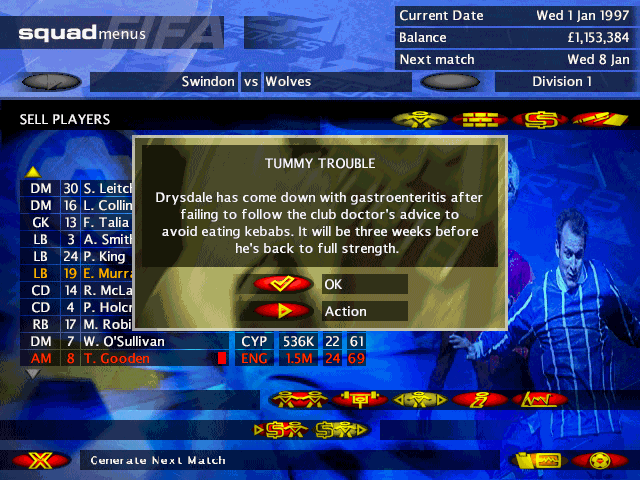
FIFA Soccer Manager
Written by: Rik
Date posted: March 9, 2010
- Genre: Sport
- Developed by: Electronic Arts
- Published by: Electronic Arts
- Year released: 1997
- Our score: 4
If you’re at all interested in this sort of thing, then no doubt you’ll be familiar with the accusation most frequently levelled at the venerable Championship Manager series by its detractors: that it’s not much to look at and about as much fun as wrestling with the latest version of MS Excel. Of particular concern to such people was the match sequences themselves, which could be likened to sitting down to watch a game on Teletext, but with details of any noteworthy incidents being relayed via a series of text descriptions, and feedback on your players’ performance coming in the form of a score out of ten. “But why can’t you watch the matches?” they would bleat.
And this seemed so jolly unreasonable, of course, because by the time the second and third CM games were out, we’d already had several thousand football games, any one of which – to the untrained eye – could easily have been adapted to act as the match day part of a management game. If you could have moving graphics instead of text, why would you stick with the text?
Such was the thinking behind the likes of FIFA Soccer Manager, which certainly wasn’t the first game of its type to boast full-match highlights, but it did represent the entrance of a big-name football game brand into the management arena. The annual FIFA Soccer releases were just starting to dominate the market and the time had come, it seemed, for EA to muscle in on CM’s ground – with the promise of delivering something the market leader could not.
So, we’ll get to those match highlights in a minute, but before we do, it’s perhaps worth considering just why they were absent from CM until the fourth instalment arrived in 2003, and when they did arrive it was in the form of dots and blobs viewed from above, rather than fab-whizzo 3D. Was it laziness? Lack of expertise? Not likely. It was most probably the realisation that the technology to produce lifelike highlights that would be genuinely useful to watch as a pretend football manager was still some distance away, and until that time, whatever was available would limit rather than enhance the whole experience.
Anyway, we’re supposed to be talking about FIFA Soccer Manager here, so we may as well start by saying that the match sequences in this game highlight perfectly why the clamour to include them in management games was so misguided. Based on a version of the original FIFA engine, the games depicted here in no way represent real football, with a whole host of shortcomings that I’m happy to summarise. For a start, all of the players are strangely static, particularly the goalkeepers, who remain rooted to their line at all times and appear curiously slow to react to any kind of danger. Most of the time, it doesn’t matter, because the vast majority of efforts at goal are fired twenty yards over the bar, but occasionally a player will manage to fashion a goalbound effort, usually in the form of a dribbly daisy-cutter or a loopy one from outside the area, which will invariably result in a goal despite the fact that it should have been saved with ease.
Further upfield, the bulk of the work seems to be done by your strikers, with defence and midfield strangely passive and reluctant to get forward. A passing game seems largely beyond any of the players on display, with aimless hoofs forward proving most effective. Substitutions take an age to effect because you have to wait for the ball to go out (which it hardly ever does). And as for ‘big-match’ atmosphere, it’s also sadly lacking: the crowd are entirely motionless, faceless mannequins standing around in your team’s colours like they’re in a Gap advert. They don’t make a lot of noise, either, with particularly poorly-attended matches played out in a comically sparse atmosphere where the referee’s whistle and the encouragement of a solitary supporter are the only sounds to be heard.
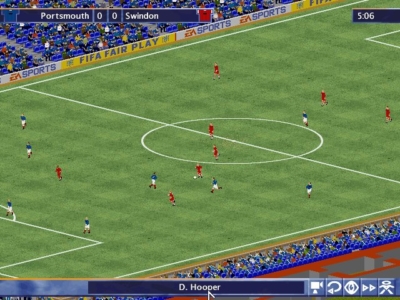
“Heart-throb” Hooper (not my words, but those of the game while reporting a comedy injury) takes a run at the defence…
That’s not to say that the games are entirely unengaging. Just because the graphics and sound are poor and the players (and their actions) are often comical, it doesn’t mean you won’t be cheering your team on, punching the air with delight when you score, and launching into a marathon of swearing when you concede. A useful point of comparison here is International Cricket Captain, which if anything is even further away from providing meaningful highlights of a subtle and intricate sport than this game, but manages to draw you into the action nonetheless.
Still, the feeling that persists while you watch each match unfold is that you have absolutely no idea whether any of your tactical choices are making any difference to what’s going on. You can give the team a general instruction to ‘attack’ or ‘defend’ as well as issuing individual orders to players, but it’s pretty hard to tell if they’re actually behaving any differently. At one stage I did manage to convince myself that the players I’d told to ‘run with the ball’ were doing so, but it could equally have been my imagination. You can give a player a ‘free role’ – which in real life would be a useful way to allow a particularly gifted midfielder the chance to direct the game, but in reality all this means is that he aimlessly chases around after the ball throughout the match.
So the matches themselves serve little useful purpose, either as a convincing spectacle, or as a way of seeing your instructions carried out on the pitch. But it still wouldn’t be so bad as long as there was some kind of supplementary statistical backup upon which you could rely to evaluate your team’s performance. There is a ‘form’ rating (mystifyingly, all ratings and stats in the game are out of 100) but it doesn’t relate to individual matches and seems to be a kind of indicator of how well a player is supposed to be playing in general.
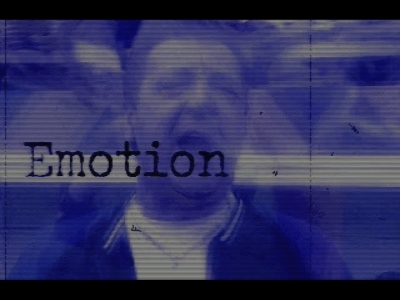
I can’t decide whether this guy is supposed to be a rock ‘ard cockney nutter kind of a manager, or a jolly but passionate Italian stereotype kind of a manager. What’s certain is: he’s a manager, and he’s emotional.
With so little feedback to work with, you’re left to either chop and change in the hope of effecting some kind of discernable alteration in your team’s performance, or simply stick the players with the highest stats in the team and hope for the best. You can tinker with the training sessions, buy and sell players, and fiddle with the formation, or you can choose not to bother – it seems to make little difference. I tried both approaches and my side fared equally well (or badly, depending on how you look at it) except the second approach involved a lot less effort and frustration on my part and I began to greatly prefer it.
So, although my team were doing okay (better than they managed in real life – I checked) there was a marked absence of desire on my part to press on and make them better. As anyone who has stayed up all night scouring the transfer market in Championship Manager will tell you, one of the reasons you might enjoy a football management game to the point of obsession is the pathological conviction that a couple of new signings will make all the difference, that good results are just around the corner, and that trophy-winning glory will ultimately be yours. In FSM you can be perfectly happy to coast along, which certainly isn’t a good sign.
Like many other management games, this one also makes the mistake of getting you involved in off-pitch matters that most people don’t give a toss about. The first decision you have to make in the game relates to how much merchandise to buy for the club shop, and there are other boring details relating to contracts with concession stands, ticket pricing and stadium development that you have to contend with along the way. If you hope to be able to ignore this side of things, the game normally finds a way to involve you: in my case, I neglected to monitor the state of our pitch and found that the club had been banned from playing home matches (by FIFA, natch) until the situation had been rectified. Football historians, correct me if I’m wrong, but I can’t remember that ever happening to a league club. Ever.
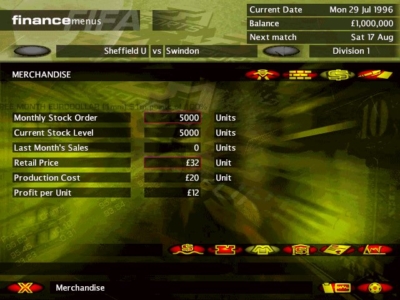
The game raises a good point: as the man in charge of first-team affairs, how much merchandise should I order? And what should the markup be?
Oh, and while we’re on the subject of ridiculous incidents, FIFA Soccer Manager also features ‘comedy’ random events that can disrupt your season. One of my players was out for four matches after eating a dodgy kebab, while another had his foot bruised by an over-eager fan standing on it at an autograph signing. Oh, the hilarity. I’d have much preferred it if the game had just told me they’d pulled up injured in training. Because, you know, that actually happens.
So, then, as you may have guessed, FIFA Soccer Manager isn’t all that good. Instead of surpassing the great Championship Manager, it only serves to underline just how superior to everything else that series was (and continues to be, albeit under the new name Football Manager). In fact, before CM, this is how all football management games used to be; it’s the kind of game that inspired the Collyer brothers to work on one of their own. Misspelled names, players out of position, silly ‘match highlights’, seemingly random results – all errors that feature here – are straight out of the 8-bit era. In a strange way, it’s kind of playable for a while, but not for long enough to make it worth seeking out.

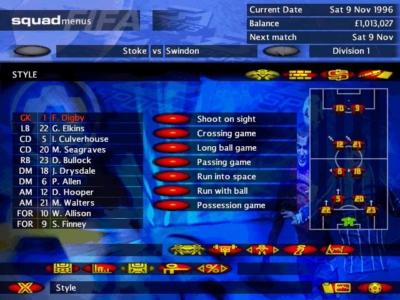

 Posts
Posts